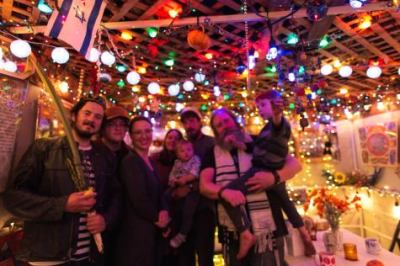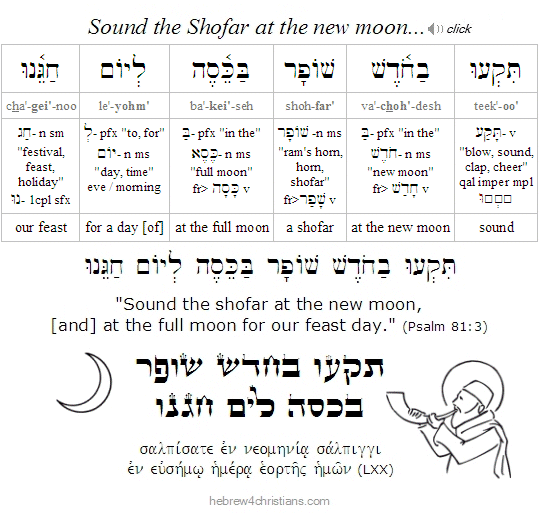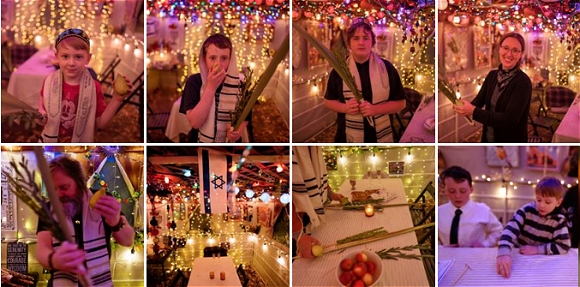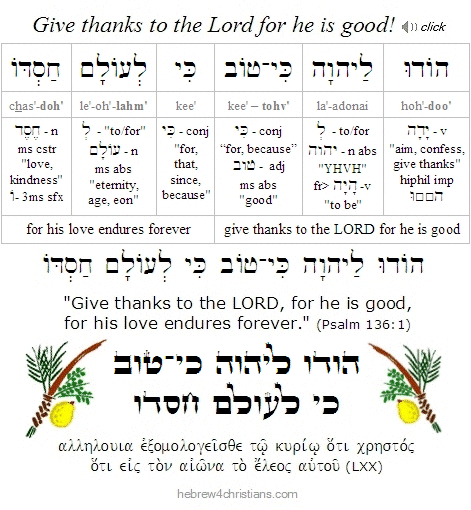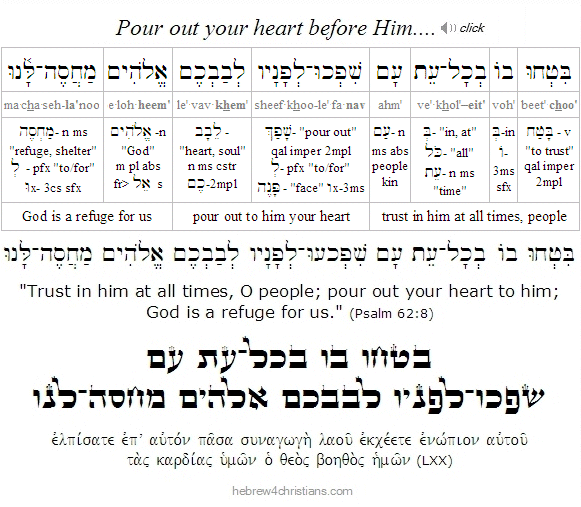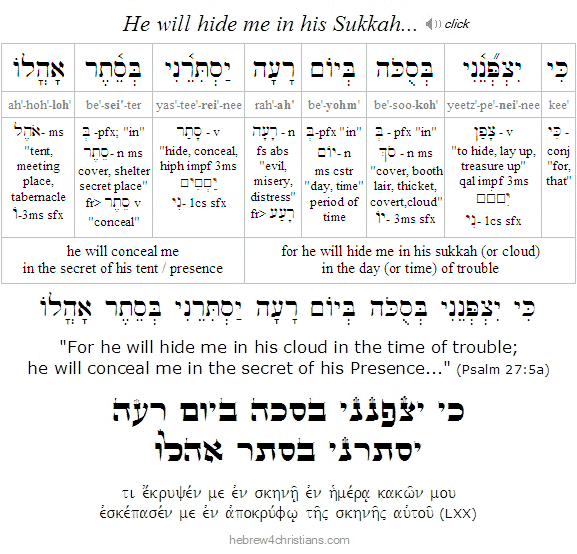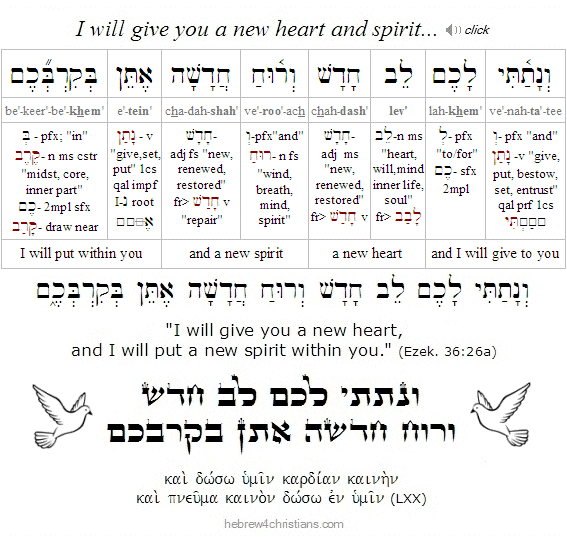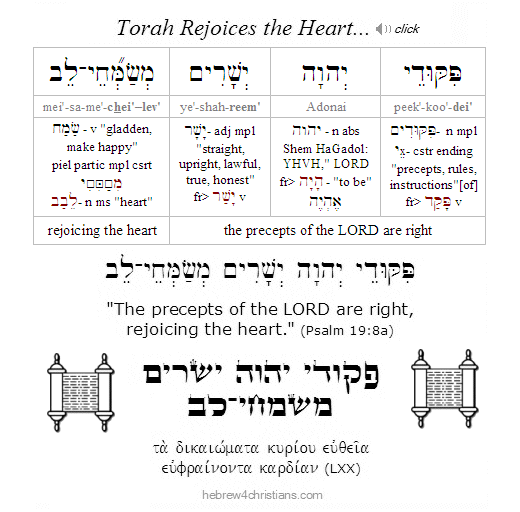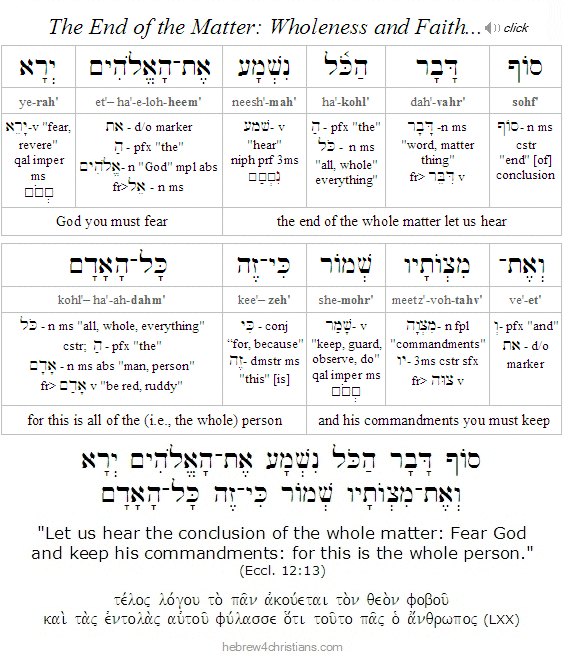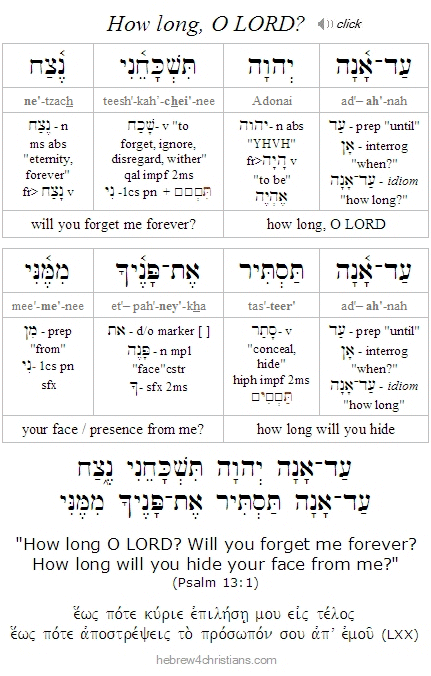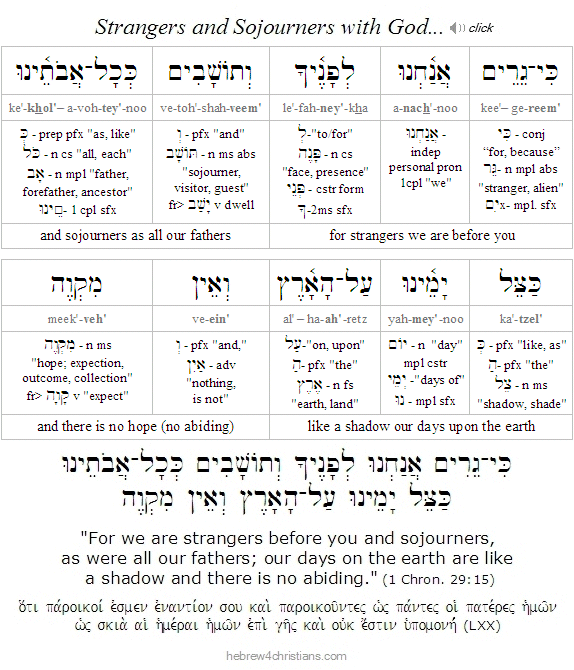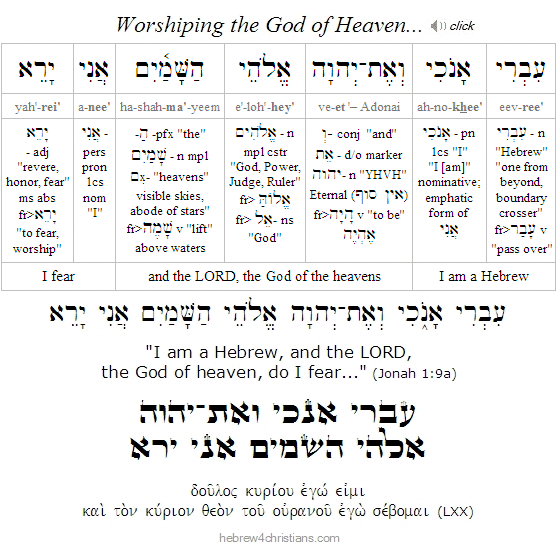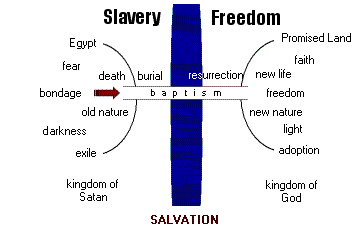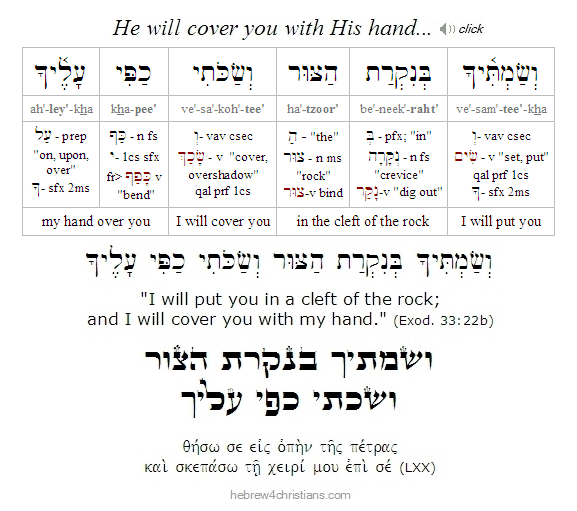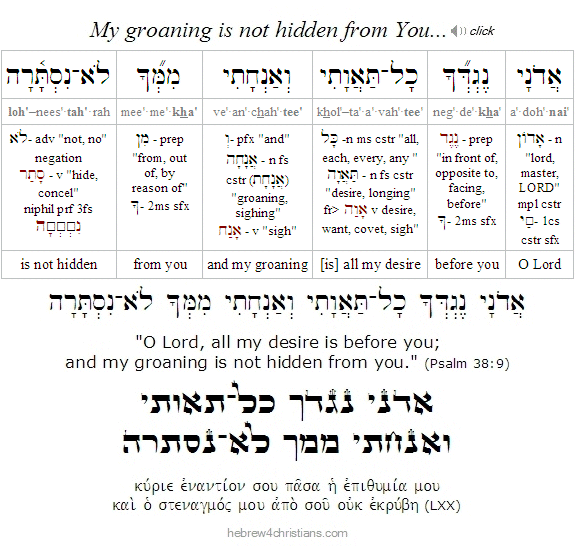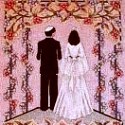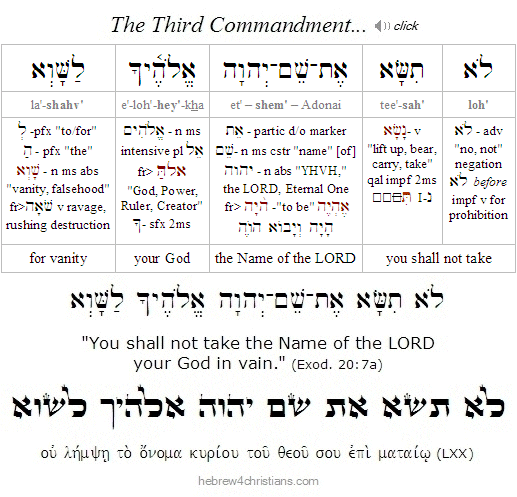|
|
|||||||||||||||||||||
 |
|||||||||||||||||||||
|
Learn Hebrew |
|||||||||||||||||||||
 |
|||||||||||||||||||||
|
Learn Torah |
|||||||||||||||||||||
|
October 2020 Updates (continued)
10.06.20 (Tishri 18, 5781) In Hebrew, the word for truth, i.e., emet (אֱמֶת), contains the first, middle, and the last letter of the Hebrew alphabet, indicating that truth encompasses all things and endures from the beginning (א) to the end (ת). The sages sometimes say "the seal of God is truth," since the final letters of the three words that conclude the account of creation, namely, bara Elohim la'asot ("God created to do" [Gen. 2:3]), spell the word emet. The word for falsehood, on the other hand, is sheker (שֶׁקֶר), composed of letters near the end of the alphabet, suggesting instability, impermanence, and distance from God. Indeed the letter Aleph represents the preeminent and ineffable glory of God, but if we remove Aleph from the word emet, we are left with the word "dead" (i.e., met: מֵת), the opposite of life (i.e., chayim: חַיִּים). Therefore, if we attempt to ignore or suppress God in our understanding of truth, we end up with death. And since Yeshua told us, "I am the way (הַדֶּרֶךְ), the truth (הָאֱמֶת), and the life (הַחַיִּים); no one comes to Father apart from me" (John 14:6), those who deny His reality are in a state of spiritual death. אָנכִי הַדֶּרֶךְ וְהָאֱמֶת וְהַחַיִּים a·no·khee · ha·de'·rekh · ve·ha·e'·met · ve·ha·chai'·yeem "I am the way, and the truth, and the life.
Of the thirteen attributes revealed to Moses that defined the Name י־ה־ו־ה (Exod. 34:6-7), two are joined together. The LORD is rav chesed ve-emet (רַב־חֶסֶד וֶאֱמֶת), abundant in lovingkindness and truth, indicating that his love is always the Center of Reality... In other words, just as God's Name means "Presence" and "Breath," it also means "Compassion," "Love," "Life," and "Faithfulness." As Yeshua testified: "I AM Aleph and Tav, the beginning and the ending," says the LORD God (יְהוָה אֱלהִים), "the One Who is, and Who was, and Who is to come (הַהוֶה וְהָיָה וְיָבוֹא), the LORD of Hosts" (Rev. 1:8).
There is no truth or reality apart from the Divine Presence of the LORD God of Israel, Adonai Shammah, the Source and Center of all things. God is the origin of all light, energy, and magnetism of the universe... Logic is the grammar of being "hardwired" into intelligibility...
Sanctifying our Days...  10.06.20 (Tishri 18, 5781) The "appointed times" of the Scriptures (i.e., mo'edim: מוֹעֲדִים) were given by God to help us turn away from the omnipresent urge within the human heart to embrace vanity: "Every one of you shall revere his mother and his father and guard (שָׁמַר) my Sabbaths (שַׁבְּתתַי)... Do not turn to worthlessness (i.e., אֱלִיל) or make for yourselves any molten gods" (Lev. 19:3-4). In other words, the Biblical holidays - including Shabbat, Passover, and so on - were intended to help us to sanctify ("set apart," "make holy") the times and seasons in order to remind us of God's Presence (Psalm 104:19). Therefore they are called mikra'ei kodesh (מִקְרָאֵי קדֶשׁ), "times in which holiness is proclaimed" (Lev. 23:2). The Torah's declaration that these days are holy implies that they are set apart for special activities, such as commemorating God as our Creator (Shabbat), our Redeemer (Passover), our Resurrection (Firstfruits), our Lawgiver (Shavuot), our King (Rosh Hashanah), our High Priest (Yom Kippur), our Sustainer (Sukkot), and so on. In this connection it should be noted that it is a mistake to assume that the divine calendar was somehow abrogated with the cross of Yeshua, since all of the Jewish holidays center on Him, and indeed the advent of the Ruach Ha-Kodesh (Holy Spirit) occurred after the resurrection of Yeshua, precisely during the prescribed 50th day Jubilee of Shavuot or "Pentecost" (Acts 1:8; 2:1-4).
Happy Sukkot Friends!  10.06.20 (Tishri 18, 5781) During the holiday of Sukkot we construct a sukkah, a "booth" or temporary structure, that we will "live in" for the holiday week. Among other things, living in a sukkah is meant to recall God's surrounding love and care for us as we make our journey through the desert of this world on our way to Zion... It is an attempt to make visible the invisible, to catch a glimpse of God's abiding glory. On a spiritual level, however, the essence of Sukkot is "dwelling" or "abiding" in the Divine Presence. And though the LORD is forever enthroned in heaven as our Creator, our King, and our loving Deliverer, and though indeed the heavens shout out his praise and the whole earth is filled with His glory (Isa. 6:3), nevertheless we must make a dwelling within our hearts. In great humility the LORD stands at the door and knocks (Rev. 3:20). "Where does God dwell," it is asked, "but where He is given a place, a sanctuary, a throne within the heart."
Left-to-right (top): 1. Olga lights candles; 2. kiddush; 3. netilat Lulav; 4. Sukkot full moon;
Left-to-right (top): 1. Emanuel David ("Manny"); 2. Judah Avram; 3. Josiah Yisroel; 4. Olga;
A view inside the Sukka... There are two great questions God always is asking us. The first is "who do you say that I am?" and the second is "will you make a place for me?" Being in a love relationship with God is the goal of life, the "end of the law," and the reason we were created. But we cannot love God apart from understanding his passion for us. The LORD is the "Jealous God," a Consuming Fire, the One who desires all of our heart on the altar (Luke 9:23). Therefore the very first commandment is simply אָנכִי יְהוָה אֱלהֶיךָ, "I AM the LORD your God" (Exod. 20:2), because without "making a place" God's love within your heart, nothing else will follow. הודו ליהוה כי־טוב ho·doo la·Adonai kee-tov "Give thanks to the LORD, for he is good, Indeed, is there any better reason to give thanks to the LORD than because of His steadfast love, i.e., His chesed (חֶסֶד)? Is there anything greater than God's love? Can anything overcome it? Can even the hardness of your own heart somehow veto or negate it's purposes? It was because of His great love that God himself (יהוה) "emptied Himself" of heavenly glory, clothed himself in human flesh and came to us, disguised as a lowly servant. God performed this act of "infinite condescension" in order to "sukkah" with us as our "hidden King" (John 1:1,14, Phil. 2:7-8). Your neshama (soul) is likened to the "Shulamite woman" he came to woo so that you might "come into His tent" -- willingly, from a heart that comes from trust (Song of Solomon).
Whether you have the opportunity to wave the lulav in a Sukkah or not this year, we sincerely wish you a season of joy as you celebrate the sheltering presence of the LORD Yeshua in your life, chaverim... Chag Sukkot Sameach! Note: To see some larger pictures of our Sukkot celebrations, click here.
Witness of the Spirit...  10.06.20 (Tishri 18, 5781) "The Spirit shall testify of me" (John 15:26). But what is the testimony of the Spirit but the truth of the unconditional love of God given in Yeshua? The inner witness from heaven gives light to our darkness and overcomes all our fears. A great challenge, however, is to personally receive the blessing of God's acceptance because we demand to define the conditions in our own terms (that is, we refuse to believe).
The Narrow Door...  10.06.20 (Tishri 18, 5781) "Strive to enter through the narrow door. For many, I tell you, will seek to enter and will not be able" (Luke 13:24). The narrow door is the way of humility, assuming a low position, crawling, if you will, and making yourself small... It is the way of the cross of Messiah, confessing the truth of our broken condition and trusting in God alone for healing and deliverance.. The narrow door is the way of faith - trusting God's compassion and righteousness given on your behalf. The large, wide-open door is designed for the crowd and its various idols. Beware of the world that seeks to assimilate the soul: beware of becoming part of the crowd! The individual is lost and overwhelmed in the midst of the crowd and its momentum. The crowd assimilates the soul, laughs at the notion of individual responsibility, and abandons itself to the gravity of purely natural forces... The life of faith, on the other hand, refuses to regard the individual human heart as a triviality. Faith is an individual struggle, a walk into unknowing; it is the way of the sojourner who feels uneasy in this world of shadows... God is always with us and helps us stay strong and resolute, even as we struggle through the darkness of this age. Press on, chaverim! Do not lose sight of your high calling in Yeshua. The day and the hour draw near!
Sorrowful yet Rejoicing...  10.05.20 (Tishri 17, 5781) It is written that "a joyful heart (לֵב שָׂמֵחַ) is good medicine" (Prov. 17:22). Where it says, "Serve the LORD with gladness" (Psalm 100:2), the sages note that "with gladness" (בְּשִׂמְחָה) contains the same letters as the word "thought" (מַחֲשָׁבָה), which suggests that happiness is found by thinking worthy thoughts. As the apostle admonished: "Think on these things" (Phil. 4:8). We find spiritual happiness when we choose to be thankful. This is called hakarat tovah (הַכָּרַת טוֹבָה), a phrase that means recognizing or being aware of the good. Cultivate a sense of wonder. Look at the sky often, for it is the "daily bread of the eyes." Albert Einstein once said, "There are two ways to live your life; one is as though nothing is a miracle, and the other is as though everything is." Happiness is a choice, a decision to see the good, to open your eyes to wonder, and to turn away from negative, fearful visions. The Torah of the LORD rejoices the heart (Psalm 19:8); let the heart of those who seek the LORD be glad (Psalm 105:3).
Wholeness and Faith... 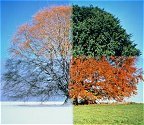 10.05.20 (Tishri 17, 5781) The Book of Ecclesiastes (i.e., megillat Kohelet) is read during the holiday of Sukkot, though you might be surprised to learn that many of the early sages did not want it included as part of the Jewish Scriptures. After all, the philosophy of Kohelet - that we are incapable of fully understanding the purposes of the world, and therefore much of what we think is important is really havel havalim (הֲבֵל הֲבָלִים), "vanity of vanities" - is contrary to a theology of reward and punishment found in the writings of Moses. This question is not unlike the Book of Job and the mysterious question as to why the righteous suffer... It is to their credit that the sages finally decided to include the scroll as part of the accepted canon, however, since it takes great humility to admit that we must continue to seek God, despite uncertainty and transience of this world. Indeed, we read this book to remind us that lasting meaning and purpose is not found in life lived "under the sun" but rather in knowing and serving God. Solomon therefore concludes his existential reflection as follows: "Fear God and keep his commandments: ki zeh kol-ha'adam (כִּי־זֶה כָּל־הָאָדָם), "for this is the whole man" (Eccl. 12:13), which suggests that those who revere the LORD and obey His Word will be healed of despair and inner vanity... סוֹף דָּבָר הַכּל נִשְׁמָע אֶת־הָאֱלהִים יְרָא sof · da·var · ha·kol · neesh·ma · et-ha-E·lo·heem · yeer·a "Let us hear the conclusion of the whole matter: Fear God Hebrew Lesson: "The grass withers, the flower fades, but the word of our God will stand forever" (Isa. 40:8). Note the great contrast between olam ha-zeh and olam haba – between this present world and the heavenly realm.... Unlike the grass of the field that dries up or flowers that soon fade, the word of God stands forever. And despite the frailty of man and the inevitability of physical death, God's truth endures, which is a foundation upon which we can rest.
A Prophetic Rejoicing...
10.04.20 (Tishri 16, 5781) Regarding the holiday of Sukkot ("Tabernacles") the Torah states, ve'samchta be'chagekha - "you shall rejoice in your holiday" and ve'hayita akh same'ach - "you shall have nothing but joy" (Deut. 16:14-15). But how can Torah command us to rejoice? "How shall we sing the LORD'S song in a strange land?" (Psalm 137:4). Can we be forced to dance, sing, and make merry? Holocaust survivor Elie Wiesel wrote, "Ve'samchta be'chagekha (וְשָׂמַחְתָּ בְּחַגֶּךָ) is said to be the most difficult commandment of the Torah, but I could never understand why. Only during the war did I understand. Those Jews who, in the course their journey to the end of hope, managed to dance on Simchat Torah... taught us how Jews should behave in the face of adversity. For them, ve'samchta be'chagekha was one commandment impossible to observe -- yet they observed it" (Joseph Lookstein: "On Man's Prayer," 1980). In this connection, let me add that these words are ultimately prophetic: "you shall rejoice; you shall have nothing but joy...." That day is coming, when our tears are wiped away and our wounds are forever healed. Chag Sukkot Same'ach, friends.
Strangers in this world... 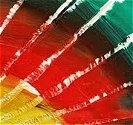 [ The following is related to the holiday of Sukkot, or the Feast of Tabernacles... ]
Chag Sukkot Sameach and Shabbat Shalom, my fellow sojourners in Messiah's hope...
Sukkot and Salvation... 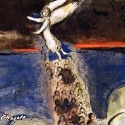 [ The eight-day holiday of Sukkot, or the "Feast of Tabernacles," begins sundown this evening. ]
So where is the true home you seek? Are you clinging to hope in this world and its counterfeit security? Are you willing to sacrifice your dignity as a child of God for the protection of the "State"? When God redeemed Israel from Egypt, it was a rebirth experience. Passover represented the means of redemption (the blood of the lamb), Shavuot represented the revelation of the holiness of God (the Sinai experience), and Sukkot represented the walk of faith as reborn and redeemed children. God took Israel out of Egypt (i.e., out of the world) in order to reveal to them who He is -- and who they were in relationship with Him.... The pattern remains the same. The world system is a form of slavery, and Sukkot reveals how God bypasses the world to care for His people...
For more on this topic, see "Sukkot and Freedom." Chag Sukkot Sameach friends!
God's Favor Upon Us...  10.02.20 (Tishri 14, 5781) Shalom friends. We read in our Torah: "You shall keep my decrees and my judgments, the pursuit of which man shall live: I am the LORD" (Lev. 18:5). The Kotzker Rebbe advised reading this verse as "You shall keep my decrees and judgments to bring life into them," meaning that we should bring all our heart, soul, and strength into the teaching of Torah. The commandments nourish the soul as food does the body. Just as we seek to make our food flavorful, so we seek to observe the truth with conviction and joy. "And may the beauty of the LORD our God be upon us, and establish the work of our hands upon us; yea, establish the work of our hands" (Psalm 90:17). וִיהִי נעַם אֲדנָי אֱלהֵינוּ עָלֵינוּ vee·hee · no'·am · Adonai · e·lo·hey'·noo · a·ley'·noo "May the beauty of the Lord our God be upon us,
Surrounded by His Sukkah...  [ The following is related to the holiday of Sukkot, or the "Feast of Tabernacles"... ] כִּי יִצְפְּנֵנִי בְּסֻכּה kee · yeetz·pe·nei'·nee · be·soo·koh "For he will hide me in his cloud (sukkah)
The LORD will conceal or "treasure you" (the word tzafan [צָפַן] means to prize as a treasure) in his Sukkah, that is, cover you with the Cloud of his Glory... in the day of trouble he will conceal you in his tent, that is, ba'makom - within his Dwelling place, under the shadow of his wings he protect you; he will elevate you upon the Rock which is Messiah (1 Cor. 10:4).
Groaning of the Heart...  10.02.20 (Tishri 14, 5781) God understands the ache of your heart: "O Lord, all my desire is before you; my groaning is not hidden from you" (Psalm 38:9). Be encouraged: Until the Master of the Universe helps, the Master of the Universe will help... Amen. God will help us, and he will help us before we even know that he helps us! Therefore do not be anxious, and do not fear, for "your heavenly Father knows what you need before you ask Him" (Matt. 6:8). God will make everything new, in the name and for the sake of his great love... אֲדנָי נֶגְדְּךָ כָל־תַּאֲוָתִי Adonai · neg·de·kha · khol-ta·a·va·tee "O Lord, all my desire is before you;
It is written, "The world is built in chesed" (עוֹלָם חֶסֶד יִבָּנֶה), which means that our inner life is being built by God's love... "So do not lose heart. Though our outer self is wasting away, our inner self is being renewed day by day. For this light momentary affliction is preparing for us an eternal weight of glory (αἰώνιον βάρος δόξης) beyond all comparison, as we look not to the things that are seen but to the things that are unseen. For the things that are seen are transient, but the things that are unseen are eternal" (2 Cor. 4:16-19). We must trust in God's unseen hand for our good.
[ The following is related to the holiday of Sukkot, the "Feast of Tabernacles." Chag Sameach. ] סוֹמֵךְ יְהוָה לְכָל־הַנּפְלִים so·mekh · Adonai · le·khol-ha·no·fe·leem "The LORD upholds all who are falling The Kotzer Rebbe said that the verse, "this is my God, and I will praise him, my father's God, and I will exalt him" (Exod. 15:2), may be understood as, "this is my God, and I will make a dwelling for Him within me." Though the LORD is forever enthroned in heaven as our Creator, King, and Deliverer, we still must make a dwelling within us. He stands at the door and knocks. "Where does God dwell," it is asked, "but where He is given a dwelling place, a sanctuary, a throne within the heart?"
Name in Vain (הדיבר השלישי) 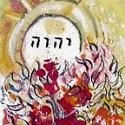 10.01.20 (Tishri 13, 5781) The Third Commandment states: lo tissa et shem Adonai Elohekha lashav, "You shall not lift up (lit. "carry") the Name of the LORD your God in vain" (Exod. 20:7). Note that the Hebrew word lashav (לַשָּׁוְא), usually translated "in vain" in English, means in an empty or thoughtless manner (the LXX translates it as ἐπὶ ματαίῳ, "worthlessly" or "thoughtlessly"), though the word might also be rendered as "for show," that is, insincerely or for sake of others. Obviously "lifting up the Name" of God 'lashav' includes invoking the Divine Presence in profane and vulgar ways, but it also includes "lip-service" expressions of faith, mechanical confessions, heartless acts of service, and so on. "Lifting up the Name" should never be used as a "weapon" against others, nor should it ever be used to justify or practice violence. You cannot "call upon God's Name" in the truth without first exercising genuine reverence by recognizing the sacredness of life, the value of other people, and the LORD's all-consuming glory, love, and power...
Wholehearted with God...  10.01.20 (Tishri 13, 5781) In the Torah we read, "Keep yourselves away from a false matter" (Exod. 23:7). In this connection note that the Hebrew word for falsehood (or lie) is sheker (שֶׁקֶר), which can be rearranged to spell kesher (קֶשֶׁר), meaning a band, gang, or group of people... The power of the lie is often found in the "group" rather than in the individual, and if enough people in a group repeat something untrue, eventually the individual's conscience will be overruled and the truth will be lost... This is a common methodology regularly employed by mass media for purposes of political propaganda.
|
|||||||||||||||||||||||||||||||||||||||||||||||||||||||
|
Hebrew for Christians |
|||||||||||||||||||||||||||||||||||||||||||||||||||||||
|
|||||||||||||||||||||||||||||||||||||||||||||||||||||||



